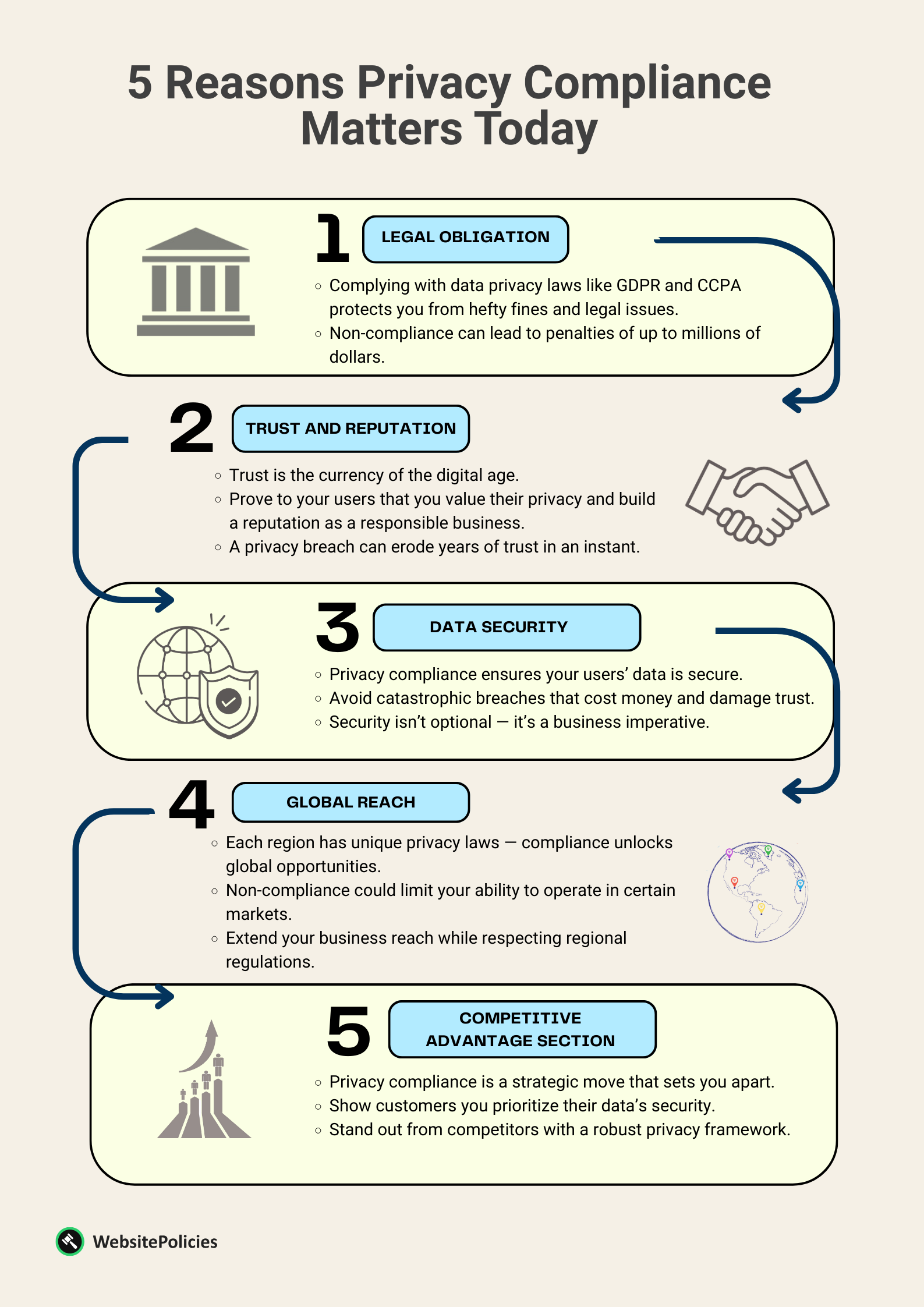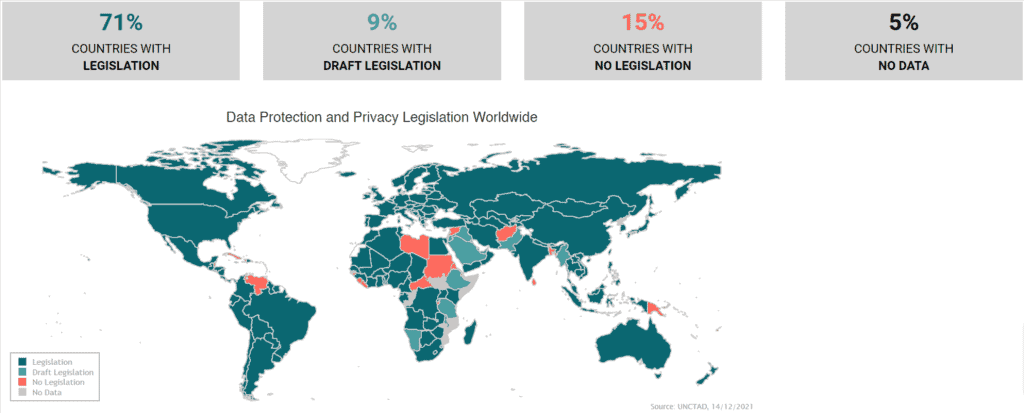Every piece of personal information that circulates on the internet has immense value. Think about it: each time a user provides their name, email, or preferences, they’re handing over a tiny part of their identity, trusting you to keep it safe.
Protecting this data isn’t just a technological requirement but an ethical one. Data privacy compliance is about more than following a set of rules, it’s a commitment to being a reliable guardian of someone’s personal details.
This article is your guide to understanding the essentials of data privacy, its significance, the laws governing it, and how to ensure your business remains a trustworthy entity. Let’s get started.
- Privacy compliance is critical in the digital age, ensuring users’ data remains safe and confidential, fostering trust, and upholding legal integrity.
- Beyond meeting legal standards, privacy compliance builds and maintains trust, guarantees data security, expands global reach, and provides a competitive edge, safeguarding business reputation.
- Businesses should maintain a transparent privacy policy, accurately map out data, secure clear user consent, establish strong security measures, and more.
Table of Contents
PRO TIP: Take the hassle of writing your own privacy policy away with our privacy policy generator trusted by over 200,000 businesses. It’ll save you hours of work and possible costly legal mistakes.
What Is Data Privacy Compliance?
Data privacy compliance is the practice of following specific rules and regulations to protect the personal information of individuals that you collect, process, or store. It’s essentially respecting the privacy of your users and ensuring their data remains safe and confidential.
Why is it so important? Well, it all comes down to trust and responsibility. When you gather data from your users, like their names, email addresses, or other personal details, they trust you to handle it with care. It’s an essential element of the trust they place in your business.
If that trust is broken, it can be disastrous. A data breach, where unauthorized individuals access or steal user data, not only damages your reputation but can also lead to severe legal consequences.
So, let me be clear – data privacy compliance isn’t just a matter of choice; it’s a key aspect of maintaining trust and legal integrity in this digital age.
Why Is Privacy Compliance Necessary?
Compliance is not just a recommended step but a requirement for individuals and businesses alike. Let’s explore some of the reasons behind the importance of privacy compliance.

Legal Obligation
It’s essential for any online business to comply with data privacy regulations. Laws like the General Data Protection Regulation and the California Consumer Privacy Act outline strict requirements for handling user data. When you don’t meet these standards, you expose yourself to hefty fines and legal troubles.
Trust and Reputation
When you think about it, trust is the currency of the digital age. It’s what keeps users coming back. Privacy compliance is your ticket to earning and maintaining that trust.
When you show your users that you value their privacy, you’re building a reputation as a responsible entity in their eyes. On the other hand, if you breach that trust, it’s incredibly hard to regain.
Data Security
When you prioritize compliance, you’re ensuring that your users’ data is protected with the highest level of security. It’s not just about following rules but also about putting the best practices in place to safeguard sensitive information.
A data breach can be catastrophic, both financially and in terms of trust. So, remember, security isn’t an option; it’s a must.
Global Reach
In our interconnected world, your business can easily reach a global audience. Each region might have its own set of rules and regulations regarding data privacy.
Ensuring compliance with these various standards isn’t just about playing by the book. It’s about being able to extend your reach and engage with audiences around the world. Non-compliance can restrict your operations and limit your potential.
Competitive Advantage
Here’s the thing about data privacy compliance — it can be a real advantage if you do it right. It’s a strategic move that can set you apart from competitors who might take a lax approach.
You’re showing your users that their data’s security matters to you, and that can be a powerful magnet for more customers and collaborations.
Essential Laws You Must Be Familiar With
Let’s talk about the global landscape of data privacy. As of today, an impressive 137 out of 194 countries around the world have implemented data privacy legislation.

These data protection laws vary widely in scope and stringency, and every business should definitely be familiar with them. More than being legal jargon, they are also instruments that define how you should handle your users’ data and why it’s important to do so.
The first one on the stage we have is the GDPR. This European Union law, which became effective in 2018, is like the gold standard of data protection.
It’s not just for EU-based operations – if you have European users, it matters. GDPR is all about openness, consent, and user privacy rights. You’re required to be clear about how data is used and to seek explicit permission for processing.
If your online presence reaches the shores of California, then CCPA is the star of the show. This California law gives its residents more control over their personal data.
To comply, you need to be transparent about your data practices, offer opt-out choices, and ensure that those who decide not to share their data still receive equal services.
In the healthcare arena, the Health Insurance Portability and Accountability Act of 1996 (HIPAA) takes the spotlight.
It governs the use of medical and health-related data. Being HIPAA-compliant means embracing rigorous security measures and ensuring that only authorized personnel can access sensitive patient information.
Brazil’s General Personal Data Protection Act (LGPD), often likened to GDPR, focuses on putting the user in control.
Brazilian citizens are granted power over their data, and businesses handling that data must meet certain obligations. For online operations in Brazil, compliance is a must.
Our Canadian friends should take note of the Personal Information Protection and Electronic Documents Act (PIPEDA). This data privacy law prioritizes consent, data access, and transparency.
Now, these laws might seem very complicated, but they share a common thread: protecting consumer data.
PRO TIP: Understanding how these laws operate and what they demand will send a big message to your customers.
How Does Data Privacy Compliance Impact Businesses?
Data privacy compliance can significantly affect you and your business in several ways.
For instance, data breaches are like digital landmines, ready to cause problems. By prioritizing compliance, you equip yourself with robust security measures, effectively reducing the risk of unauthorized access or data theft.
But data privacy compliance is not just about defense; it’s also about offense. Your reputation and brand image are immeasurable assets in the digital world.
By demonstrating your commitment to data privacy, you’re fulfilling legal requirements and building a strong brand image at the same time. Users appreciate organizations that safeguard their data, and it definitely sets you apart in the competitive landscape.
Trust, the lifeblood of customer relationships, is strongly linked to data privacy. When customers know their data is in secure hands, it builds trust. This trust, in turn, results in customer loyalty. As your business gains loyal customers, your customers gain a reliable partner.
And, do you know that increased sales come hand in hand with trust? Users are more likely to engage with your business when they feel confident about their data’s safety.
The trust and sense of security combined can transform occasional visitors into loyal, revenue-generating customers. It’s the practical manifestation of the trust you can build through data privacy compliance.
Finally, consider the elephant in the room: legal penalties. Non-compliance with data privacy regulations can lead to significant fines and legal complications.
By following data privacy compliance, you’re not just steering clear of these financial burdens, but also preserving your business’s legal integrity. It’s a responsible and proactive approach that ensures you stay on the right side of the law.
Failing to prioritize data privacy is like sailing blindfolded into a minefield of legal consequences and reputational damage. One misstep can have lasting implications.
How to Ensure Data Privacy Compliance?
Now that we’ve discussed the significance of data privacy compliance, the natural question is how to ensure it for your business.
Let me share some practical steps I usually recommend. Adding these steps to your compliance program will help you go through the path of data privacy with more confidence.
- Transparent Privacy Policy: Establish a clear and comprehensive policy that outlines your data practices. Make it easily accessible on your platform, ensuring users understand how their data is utilized and safeguarded.
- Data Mapping: Understand the scope of your data collection. Know what data you’re collecting, where it’s stored, and its purpose. This clarity helps in ensuring compliance and pinpointing potential risks.
- Obtain Clear Consent: Before collecting any personal data, especially sensitive information, secure explicit and informed consent from users. Offer clear opt-out options and respect users’ privacy choices.
- Implement Robust Security Measures: Adopt best practices like encryption and access controls to protect user data from unauthorized access. Regularly conduct security audits to identify and rectify vulnerabilities.
- Continuous Staff Training: Equip your team with knowledge about evolving data privacy regulations and best practices. Regular training sessions reinforce the importance of data security and keep everyone aligned with compliance standards.
PRO TIP: Regularly review and update your data privacy practices to stay in sync with changing regulations and user expectations. The more proactive you are, the better you’ll protect your business and build trust.
Frequently Asked Questions
What is data privacy compliance?
Data privacy compliance involves following rules to ensure the personal information of users is kept safe, confidential, and protected from unauthorized access or breaches.
Why is data privacy compliance important for businesses?
It establishes trust with users, ensures legal integrity, protects from data breaches, and upholds a business’s reputation in the digital age.
What are the key reasons for ensuring privacy compliance?
Compliance ensures legal adherence, builds trust and reputation, guarantees data security, expands global market reach, and offers a competitive advantage.
How does non-compliance affect businesses?
Non-compliance can lead to hefty fines, legal complications, damaged reputation, loss of customer trust, and limited business opportunities.
Which laws should businesses be familiar with for data privacy?
Businesses should be acquainted with GDPR, CCPA, HIPAA, LGPD, and PIPEDA, among others, depending on their operational regions and user demographics.
How does data privacy compliance benefit businesses?
Compliance safeguards against data breaches, enhances brand reputation, fosters customer trust and loyalty, increases sales, and ensures legal adherence.
What are the steps to ensure data privacy compliance?
Businesses should have a clear privacy policy, conduct data mapping, obtain user consent, implement security measures, and regularly train their staff on data privacy.



